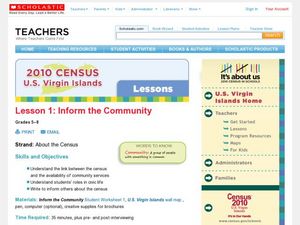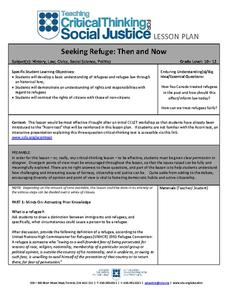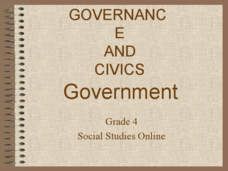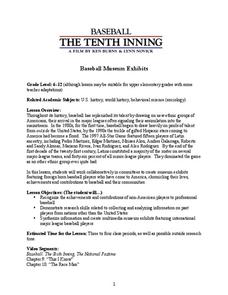Curated OER
African-American Soldiers After World War I: Had Race Relations Changed?
Students utilize an online database to conduct research and analyze the conditions for African-Americans before and after World War I. They consider the role of the 92nd and 93rd divisions in affecting social change.
Curated OER
Inform the Community
Students gain an understanding of the U.S. Census. In this social studies civics lesson plan, students explore understand the link between the census and the availability of community services.
Constitutional Rights Foundation
Plyler v. Doe: Can States Deny Public Benefits to Illegal Immigrants?
Illegal immigration is an ever-changing source of consistent controversy. A reading passage about the rights of undocumented workers and illegal immigrants—and the lack thereof—guides high schoolers into a mock trial activity. Three...
iCivics
Step Nine: Action Campaign
It's time to take action! Learners strategize their action campaigns by using the resource and past brainstorming activities from the series that help them pinpoint problems in their communities. They use included templates to get the...
Center for Civic Education
Martin Luther King Jr. and the Power of Words
It is easy to forget the power that written or spoken word can have in effecting change. Using quotations from such inspirational leaders as Maya Angelou, Mahatma Gandhi, and Martin Luther King Jr., encourage your class members to...
Canadian Civil Liberties Education Trust
Seeking Refuge: Then and Now
Participants examine refugee law and policies and read several case studies to prepare for a discussion of this hot-button issue. The packet includes a wide range of materials representing a variety perspectives.
Judicial Branch of California
Faces of Citizenship: Jury Duty
An interesting middle school lesson focuses on the rights and responsibilities of citizens. Academics choose a civic project to complete, such as an oral history or photo essay. They then conduct interviews with members of the community...
Facing History and Ourselves
Public Art as a Form of Participation
David Binnington's mural commemorating the 1936 Battle of Cable Street is the focus of a instructional activity that looks at public art as a form of civic participation. After reading background material about the mural, individuals...
Student Handouts
Voting Rights Speech Before Congress
Is your class studying civil rights? Consider taking a look at President Lyndon B. Johnson's voting rights speech. This resource includes an abridged version and three related questions. Pupils consider Johnson's use of language and the...
Carolina K-12
Advocacy 101
Want a change? Become an advocate. As part of a study of the responsibilities of good citizens, class members engage in a series of role plays that model how to lobby for change.
Curated OER
Calculating Population Growth for a Region
Students research population growth of regions of Canada. In this Social Studies lesson, students use included links on the Internet to find information about population growth in areas of Canada. A worksheet for each region is included....
Curated OER
World War II Laws
Students explore how laws passed during World War II have helped people with disabilities. In this social studies lesson, students research laws passed since World War II and complete a WWII Law chart.
Curated OER
Supreme Court Case Study: District of Columbia Vs Heller
Examine the Supreme Court case, District of Columbia vs Heller, to build a better understanding of the Bill of Rights. Learners visit three different websites, read the provided informational text, and then answer a series of critical...
Curated OER
Governance And Civics: Grade 4
This PowerPoint provides elementary students with a basic overview of the structure and workings of the US Government. Students will be introduced to the 3 branches of Federal and State Government, the Bill of Rights, and Amendments 1,...
Reading Through History
The March on Washington
How does marching get a point across to the government? Teach pupils about civics, human rights, and freedom of speech using the resource about the March on Washington. After reading, learners complete multiple-choice and short-answer...
Curated OER
Cold War Era Film Censorship: High Noon- a Slice of Americana Or Communist
Students study of the effects of the Cold War on the home front. They analyze the film High Noon according to an abbreviated version of the standards that films were judged by in the early 1950s and determine whether or not High Noon is...
Curated OER
Social Studies: Cultural New Orleans
Students observe the PBS film, "New Orleans," to explore such topics as race relations, cultural history, and urbanization. After examining n interactive map displaying the city at various dates in its history, students role-play as...
Curated OER
Arrest- A Legal System Simulation
What would your class do if a police officer arrested a student in class? This is exactly the anticipatory set that gets pupils engaged in a unit on the legal system. The plan is to get the officer to simulate an arrest, and then guest...
Curated OER
Why Vote? A Public Awareness Campaign
Students examine the structure of local government and determine why citizens vote. In this civics lesson plan, students listen to a lecture about the structure of local government and then encourage others to exercise their right to vote.
PBS
Baseball: The Tenth Inning
The intent of this resource is to explore Latin American accomplishments in baseball, recognizing the changes in demographics of players over the last century. Social studies classes begin with a discussion and brainstorm surrounding...
New York City Department of Education
Colonial America and The American Revolution
How did the founding of the American colonies lead to a revolution? Use the essential question and sample activities to guide learners through a series of history lessons. Additionally, the packet includes effective strategies to...
iCivics
Responsibility Launcher
So how would pupils solve a town's problems? Using a video game, scholars tell residents of a town how to solve their problems by taking steps such as going back to school, voting, or serving in the military. As they make good choices,...
State Bar of Texas
Gideon v. Wainwright
How does a trial begin without a lawyer for the defendant? The 1963 Supreme Court case Gideon v. Wainwright serves as the backdrop for the study of the rights of the accused. Scholars use a short video along with paired discussion and...
Curated OER
Development of American Political Parties: The Two-Party System
Was American politics always bound to the two-party system? Learn how the two-party system developed, why third parties tend not to do so well, and all the various political parties that have emerged throughout US history. Each party is...

























